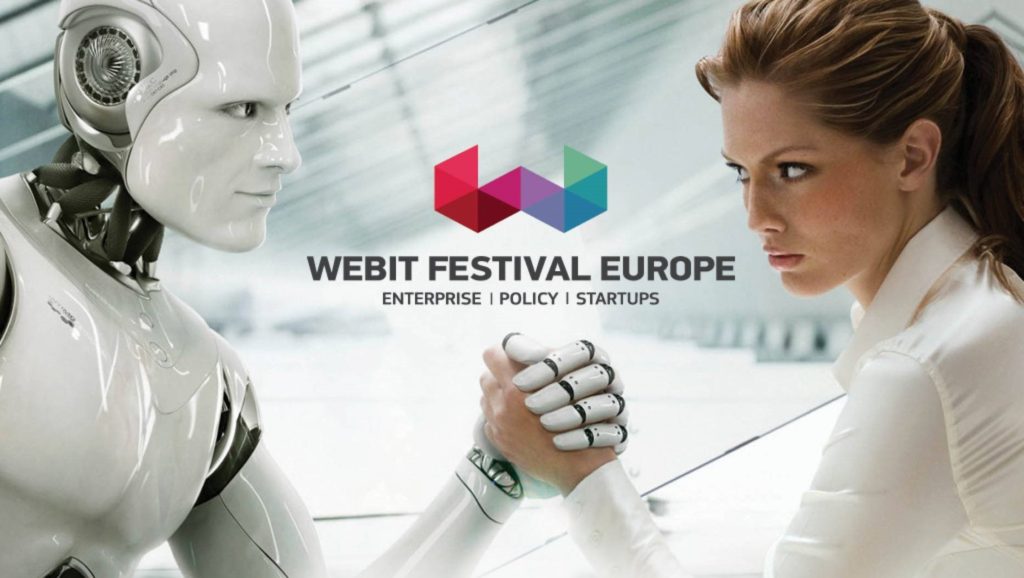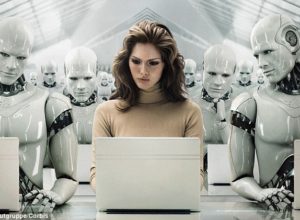Tag: jobs
What steps we need to take to secure the future of...
 We are all living in a time of exponential change both in our societies and economics. The new industrial revolution and the rise of robots and automation will change dramatically the way we live, communicate and entertain ourselves. But probably the most crucial change will come in our workplace, where we will need a completely new set of skills to stay competitive.
According to the annual Future of Jobs Report, issued by the WEF, by 2020, more than a third of the desired core skill sets of most occupations will be consist of skills that are not yet considered crucial to the job today.
Soon we will all need to make a serious effort to develop our soft skills, such as persuasion, emotional intelligence and the ability to teach others. Experts think that there will be a higher demand for such abilities, than the narrow technical skills.
This, among many other topics, will be discussed during the Innovate! & Plenary Session of this year’s Webit.Festival Europe - the largest event for innovations and entrepreneurship in this part of the world.
Students today think that getting a four-year university degree is the only way to become part of a global company such as Google, Apple or Amazon. But business leaders like the CEO of Siemens USA Barbara Humpton and her colleague in Apple Tim Cook are already questioning this old-fashioned career path.
Recently Cook pointed out that the US employment at Apple includes a lot of people who did not have degrees. And the main reason for that is the fact that most of the colleges do not teach the skills business leaders need, such as coding for example.
According to a LinkedIn report, prominent companies do not require that employees have college degrees. The data analysis of the social network identified, tha positions like electronic technicians, mechanical designers and marketing representatives are offered to people with no education but having the required skill set.
The main drivers of this exponential changes in our work requirements are four processes: high-speed mobile internet, Artificial Intelligence, adoption of Big Data analytics and Cloud Technology.
If we want to prevent a catastrophic processes in the society like mass unemployment, business and educational leaders will have to take an active role and help the workers today with re-skilling and up-skilling.
While this process will unfold on a global scale, it will also be a major challenge for the new European Commission that will be appointed after the elections for Members of the European Parliament at the end of May. The new governing body will need to develop a continent-wide strategy for developing its human resource, in order for the continent to stay competitive with new global powers, such as China, who have a more centralized authority.
Come to Webit.Festival Europe and learn about the major steps that European policy makers and corporate leaders will need to take to create a secure job market for us and for the generations to come.
During Innovate! & Plenary Session you will get the chance to listen to top enterprise, science and policy leaders, such as the Serial Entrepreneur Mark Cuban, the Airbus Defense and Space CEO Dirk Hoke, the Senior Parther at McKinsey & Co Paul Willmott, The VP of Amazon Web Services Sandy Carter and VP of Amazon Paul Misener, the EU Commissioner for Digital Economy and Society Mariya Gabriel, the Deputy Director-General of World Trade Organization Yonov Frederick Agah and many others.
Here you can see a full list of the confirmed speakers at Webit.Festival, while here you can get all the information you need about the tickets for the event.
We are all living in a time of exponential change both in our societies and economics. The new industrial revolution and the rise of robots and automation will change dramatically the way we live, communicate and entertain ourselves. But probably the most crucial change will come in our workplace, where we will need a completely new set of skills to stay competitive.
According to the annual Future of Jobs Report, issued by the WEF, by 2020, more than a third of the desired core skill sets of most occupations will be consist of skills that are not yet considered crucial to the job today.
Soon we will all need to make a serious effort to develop our soft skills, such as persuasion, emotional intelligence and the ability to teach others. Experts think that there will be a higher demand for such abilities, than the narrow technical skills.
This, among many other topics, will be discussed during the Innovate! & Plenary Session of this year’s Webit.Festival Europe - the largest event for innovations and entrepreneurship in this part of the world.
Students today think that getting a four-year university degree is the only way to become part of a global company such as Google, Apple or Amazon. But business leaders like the CEO of Siemens USA Barbara Humpton and her colleague in Apple Tim Cook are already questioning this old-fashioned career path.
Recently Cook pointed out that the US employment at Apple includes a lot of people who did not have degrees. And the main reason for that is the fact that most of the colleges do not teach the skills business leaders need, such as coding for example.
According to a LinkedIn report, prominent companies do not require that employees have college degrees. The data analysis of the social network identified, tha positions like electronic technicians, mechanical designers and marketing representatives are offered to people with no education but having the required skill set.
The main drivers of this exponential changes in our work requirements are four processes: high-speed mobile internet, Artificial Intelligence, adoption of Big Data analytics and Cloud Technology.
If we want to prevent a catastrophic processes in the society like mass unemployment, business and educational leaders will have to take an active role and help the workers today with re-skilling and up-skilling.
While this process will unfold on a global scale, it will also be a major challenge for the new European Commission that will be appointed after the elections for Members of the European Parliament at the end of May. The new governing body will need to develop a continent-wide strategy for developing its human resource, in order for the continent to stay competitive with new global powers, such as China, who have a more centralized authority.
Come to Webit.Festival Europe and learn about the major steps that European policy makers and corporate leaders will need to take to create a secure job market for us and for the generations to come.
During Innovate! & Plenary Session you will get the chance to listen to top enterprise, science and policy leaders, such as the Serial Entrepreneur Mark Cuban, the Airbus Defense and Space CEO Dirk Hoke, the Senior Parther at McKinsey & Co Paul Willmott, The VP of Amazon Web Services Sandy Carter and VP of Amazon Paul Misener, the EU Commissioner for Digital Economy and Society Mariya Gabriel, the Deputy Director-General of World Trade Organization Yonov Frederick Agah and many others.
Here you can see a full list of the confirmed speakers at Webit.Festival, while here you can get all the information you need about the tickets for the event.
Is automation the developer’s nightmare or a much needed help
The fourth industrial revolution has already led to transformations that alter our way of life fundamentally. But perhaps the most important of them all is the change in the labour market, which affects hundreds of jobs and can become a challenge even for the most sought ones - the developers.
Recent study, conducted by the Oxford University, showed that 47% of jobs in the United States are at risk of being automated in the next two decades. But according to McKinsey Global Institute, only 5% of all occupations are at risk of being entirely automated.
Rather than disappearing, the report’s authors say, jobs will change dramatically, forcing workers to adapt. McKinsey’s analysis of 800 occupations and 2,000 job tasks predicts that half of workers’ current tasks could be automated by the year 2055 using technology that currently exists.
The experts think that those changes will not lead to mass unemployment. Instead, the automation could increase global productivity by 0.8% to 1.4% annually over the next 50 years.
Those jobs are not only in the manufacturing sector, where robots will soon be doing almost every task. Today we can see the automation slowly taking over many white collar occupations, and this is just the beginning.
Industry data show that enterprises are investing more money in platforms, tools and automated processes and less in manual professional services. Eventually experts predict that robots or robo-software will replace developers and will prove to be the only solution able to support the increasing demand.
The CEO of Zuznow mobile development platform Chen Levkovich told Venture Beat that while many developers oppose automation, the new tools can help them become more efficient.
Last November Forbes reported that the custom software development company Dev9 is using artificial intelligence to eliminate strenuous processes and drastically reduce manual overhead.
Using teams of 3 to 8 people, with expertise ranging from architecture, development, project management, quality and deployment, Dev9 develops original technology that rapidly, reliably and repeatedly pushes software enhancements and bug fixes to customers at a low risk.
To learn more about the future of software development and DevOps, join the Dev Summit within Webit.Festival. On the scene you’ll see and hear top level speakers, such as the Founder and CTO of Maria DB Foundation Michael “Monty” Widenius, the Founder and CTO of Hired Allan Grant, and the Developer Evangelist in Amazon Peter Heinrich.
AI revolution is coming. How to change to keep our jobs
Artificial Intelligence and Automation are the two biggest threats to the job security in the age of the Fourth Industrial Revolution. According to a report, released by the Obama administration in the end of the last year, nearly 47% of the jobs in USA are at risk in the next 20 years.
Signs for what is coming are all over the news and even the notorious astrophysicist Stephen Hawking predicted that the increasing automation is going to decimate middle class jobs and worsen the already big inequality and political instability worldwide.
This process has already destroyed some jobs in traditional manufacturing and the development of AI is going to extend this trend to the service sector, when only management and supervisory roles remain safe, at least for now. Of course, the US administration report notes that the new technology will open new career opportunities for those with higher-level skills. But even they will need government-supported re-training programs to help mitigate the negative impact of automation by preparing displaced workers for their new jobs. Last week Japanese insurance company Fukoku Mutual Life Insurance laid off more than 30 employees and replaced them with artificial intelligence system that calculates payouts to policyholders. The firm management believes that this will boost its productivity by about 30% and will return the investment in less that two years. The annual cost savings will amount to about £1m and the cost of the system installation is £1.4m. It is based on the IBM’s Watson Explorer. Late last year the world’s largest hedge fund Bridgewater Associates announced that it is building software that will automate the daily management of the company and will deal with the hiring and firing of employees and other strategic decisions. The company’s founder Ray Dalio assigned to his software engineers the task to ensure that the firm is managed according to his vision when he is not at work. They have built a tool that incorporate different rating into personal profiles of employees that show their strengths and weaknesses. Another app set goals for them and monitor their implementation. Although there is no unanimous opinion about the exact impact of AI on the labour market and the industry in the coming years we can certainly say that it will be more than great. To understand more about the application of artificial intelligence techniques in products and business you can listen to the leader of IBM Watson Partner Innovations Europe Christoph Auer-Welsbach. He is one of the confirmed speakers in the Tech Summit of Webit.Festival 2017 in Sofia. The expert will also talk about the best practices of high-growth startups on going from tested ide to scalable company. The main topics of his lecture will focus on Machine Intelligence, Cognitive Computing, FinTech, IoT and Smart City. During the Tech Summit you can learn the latest trends in Digital Transformation, IoE, BigData & Cloud, Security & Privacy, FinTech, Money & Payments. So, don’t waste time, these are all the important links you need: To buy your tickets for Webit.Festival Europe 2017 (EarlyBird expires soon), click here. To apply for speaking, click here. To apply for partnership, click here. To apply for exhibiting, click here. StartUP? Apply for the Founders Games Challenge by Webit.Foundation and get an opportunity for free festival tickets (500), free exhibition table (100) and opportunity to win 200 000 EUR (only 1), click here. To see the video gallery from Webit.Festival 2016, click here. To learn more about the events that are part of the festival, click here. To see pictures from our previous events, click here. For more information on the Global Webit Series and our events in Dubai, Singapore, New Delhi and Istanbul: www.Webit.Org.
